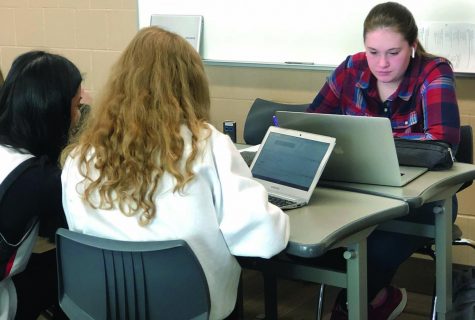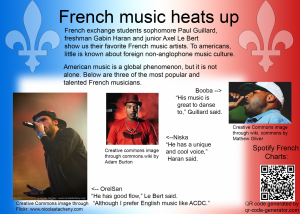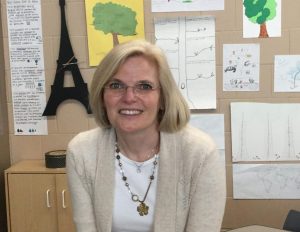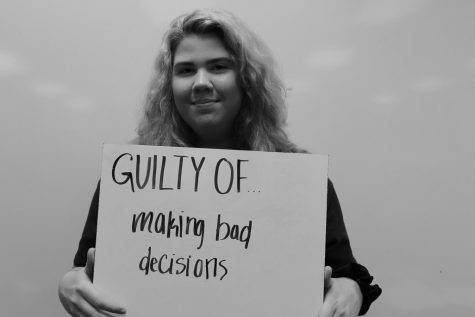French V transitions from AP to CIS
French teacher Jackie Parr’s classroom is decorated from floor to ceiling with flags, posters and other items that clearly display her love of the language. Her lively way of teaching and caring attitude towards students allow them to share her same passion and recognize the benefits of pursuing the education another language.
February 10, 2020
Advanced placement (AP) classes are college-level courses students can take to earn college credits while in high school. College in the Schools (CIS) is a program run by the University of Minnesota which offers similar benefits. In the school year of 2020-21, AP French V will be transitioning from an AP course to a CIS course, much to the enthusiasm of French teacher Jackie Parr. College credit is earned by simply passing a CIS class with a C or better, whereas an AP student needs to pass an AP exam with a score of three out of five or higher. This is one of the major differences between the courses.
“It varies whether or not the schools accept it, some do and some don’t. Some give lots of credit for it, some give very little credit for it. Whether or not a student is actually able to use the results of the AP exam depends on where they go,” Parr explained.
AP classes do not require a tuition fee to be accepted by colleges, however, students still have to pay an exam fee. These can be upwards of $60 per exam, with each deadline tacking on another $20 late fee. CIS classes are free of charge to students.
“The thing that I really like about the CIS course are the benefits for students. It won’t all rely on how they perform on a test on one day, one morning at the end of the year,” Parr said. “It’s going to be based on how they how they’ve performed in class, whether or not they passed the course, basically.”
AP students have to pass an exam in order to earn college credit for the course, it is not guaranteed. However, in CIS, as long as a student is willing to put in enough effort to pass, they are promised to earn credit.
“When a student has taken five years of a language, I don’t think it’s fair for them to have to think they might not get the credit for it,” Parr explained.
Careers in which the knowledge of two or more languages is required are often much higher paying than those that do not. For example, a translator in Minnesota would make a minimum of $39 thousand per year, much higher than the starting wages of most careers.
Parr believes learning another language, whether in or out of school, is a “life enriching experience”. She explained how the benefits of speaking multiple languages are huge. They are both personal and economic.
If a student is planning on going to college in general, they may choose to take AP or CIS courses whether or not they relate to a potential future career. Advanced courses can be a tool for students to further their interest in a topic, or just to challenge themselves.

Students work during class on Feb. 5. Madame Parr’s current French 5 class will be transitioning to a CIS (College in the Schools) French class next year.
“It could take care of a requirement in college, depending on what their requirements are. They would also want to see that you opted to take a more rigorous course,” student counselor Becky Hopper explained.
“Following your passions will lead you towards a career path that is fulfilling. Students usually enjoy the classes in which they have a natural aptitude and interest,” student counselor Liz Nelson added.
Every college treats these courses differently. Some prefer one over the other and some use the scores to help with placement and do not actually give credit. Nevertheless, students who are considering taking any AP or CIS course with the intention of using the college credit could benefit from checking the website or asking any representative of the colleges they are looking at for more information.
“Learning a language allows you to understand the world better and it gives you a international perspective on everything on everything from what you eat on a daily basis to political viewpoints,” Parr said.














Sandra Liu • Feb 29, 2020 at 12:30 pm
You did a great job with this article! I had heard about this change being made, but I did not really know exactly what was happening or how it would work. Your article did an awesome job of explaining the implications of the change both for the French program and its students. The only criticism I have is that it might have been nice to get the perspectives of some of the students taking French just to see how they were feeling about the change, but overall this was a wonderful article!
Fiona Stahl • Feb 25, 2020 at 7:45 pm
When registration came around, I was not sure what CIS meant and why AP was making the transition over to this system. Your article felt well researched and provided me with a developed explanation to what it is. I also think this article may persuade students to continue taking French throughout high school. This is because you stated the benefits that come out of taking CIS French.